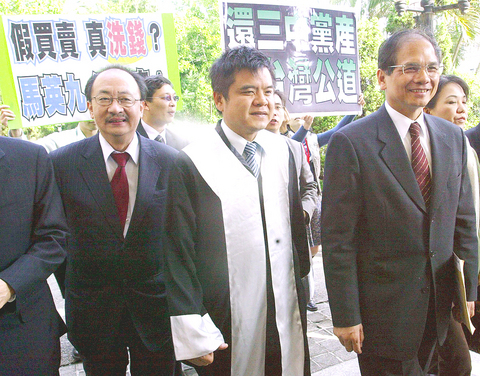Accusing Chinese Nationalist Party (KMT) Chairman Ma Ying-jeou (馬英九) of profiting from the sale of party assets, the Democratic Progressive Party (DPP) yesterday filed a lawsuit charging the KMT chief with embezzlement.
DPP Chairman Yu Shyi-kun, caucus whips Ker Chien-ming (
deal

PHOTO: CNA
"The KMT wanted to amend its party regulations for Ma. Does that mean that Ma has the money from the [asset] sales and no one else can represent the party in the 2008 presidential election?" Yu said during a press conference in the Legislative Yuan.
According to the DPP, the KMT had a deal with the buyers which guaranteed that the party received a share of the profits when the buyer disposed of assets bought from the KMT.
In the case of the sale of three media assets to a subsidiary of the China Times Group last December, the post-sale kickback was as much as NT$11.21 billion (US$341.35 million), Yu claimed.
"The KMT has been trying to delay the passage of the party asset bill in the legislature. Almost every asset sale of the KMT is problematic, but the party tried to sell as many assets as possible," Ker said, urging Ma to stop selling more assets.
Accusing the KMT of taking the money to assist Ma in the 2008 presidential election, the three urged Ma to publicize detailed records of each sale.
The four then proceeded to the Taiwan High Court Prosecutors' Office's Black Gold Investigation Center to file a lawsuit against Ma, KMT Administration and Management Committee Director-General Chang Che-shen (張哲琛), China Times Group chairman Albert Yu (余建新) and Central Motion Picture Co chairman Alex Tsai (蔡正元), accusing them of embezzlement.
Upset at the DPP's accusations, Chang later went to the Taipei Prosecutors' Office to file a lawsuit against Yu and four party legislators -- Huang Chao-hui (黃昭
debts
Chang argued that the DPP had ignored the debts that the KMT's assets had accrued when they they were sold.
According to Chang, Hua Hsia -- which manages part of the KMT's assets -- had debts of NT$5.3 billion and the three media outlets carried debts of NT$5.9 billion when they were sold.
Given this, NT$4 billion was a reasonable price, Chang said.
"The deal was made to guarantee the final selling price and protect the rights of the buyer. There was no money-laundering or profit-making involved," Chang said.

Alain Robert, known as the "French Spider-Man," praised Alex Honnold as exceptionally well-prepared after the US climber completed a free solo ascent of Taipei 101 yesterday. Robert said Honnold's ascent of the 508m-tall skyscraper in just more than one-and-a-half hours without using safety ropes or equipment was a remarkable achievement. "This is my life," he said in an interview conducted in French, adding that he liked the feeling of being "on the edge of danger." The 63-year-old Frenchman climbed Taipei 101 using ropes in December 2004, taking about four hours to reach the top. On a one-to-10 scale of difficulty, Robert said Taipei 101

Nipah virus infection is to be officially listed as a category 5 notifiable infectious disease in Taiwan in March, while clinical treatment guidelines are being formulated, the Centers for Disease Control (CDC) said yesterday. With Nipah infections being reported in other countries and considering its relatively high fatality rate, the centers on Jan. 16 announced that it would be listed as a notifiable infectious disease to bolster the nation’s systematic early warning system and increase public awareness, the CDC said. Bangladesh reported four fatal cases last year in separate districts, with three linked to raw date palm sap consumption, CDC Epidemic Intelligence

US climber Alex Honnold left Taiwan this morning a day after completing a free-solo ascent of Taipei 101, a feat that drew cheers from onlookers and gained widespread international attention. Honnold yesterday scaled the 101-story skyscraper without a rope or safety harness. The climb — the highest urban free-solo ascent ever attempted — took just more than 90 minutes and was streamed live on Netflix. It was covered by major international news outlets including CNN, the New York Times, the Guardian and the Wall Street Journal. As Honnold prepared to leave Taiwan today, he attracted a crowd when he and his wife, Sanni,

Taiwanese and US defense groups are collaborating to introduce deployable, semi-autonomous manufacturing systems for drones and components in a boost to the nation’s supply chain resilience. Taiwan’s G-Tech Optroelectronics Corp subsidiary GTOC and the US’ Aerkomm Inc on Friday announced an agreement with fellow US-based Firestorm Lab to adopt the latter’s xCell, a technology featuring 3D printers fitted in 6.1m container units. The systems enable aerial platforms and parts to be produced in high volumes from dispersed nodes capable of rapid redeployment, to minimize the risk of enemy strikes and to meet field requirements, they said. Firestorm chief technology officer Ian Muceus said